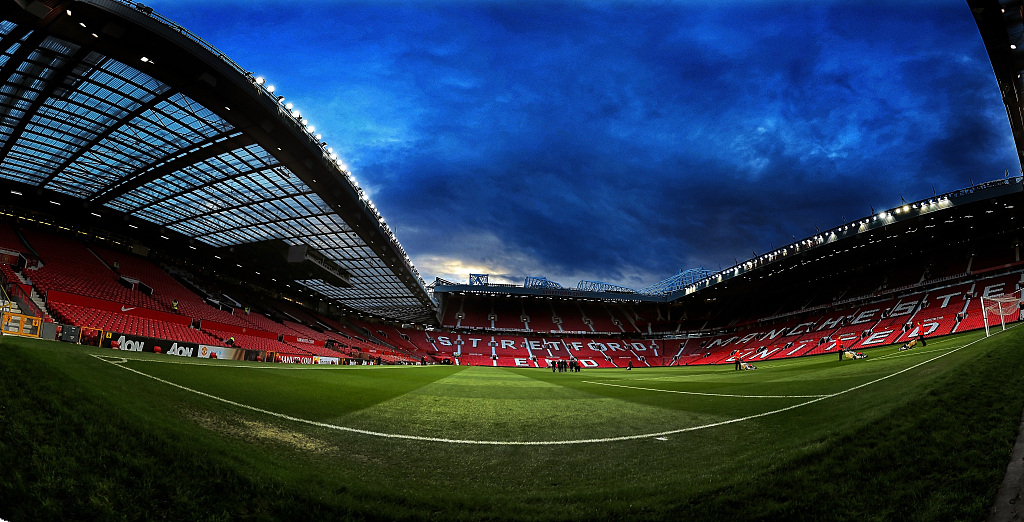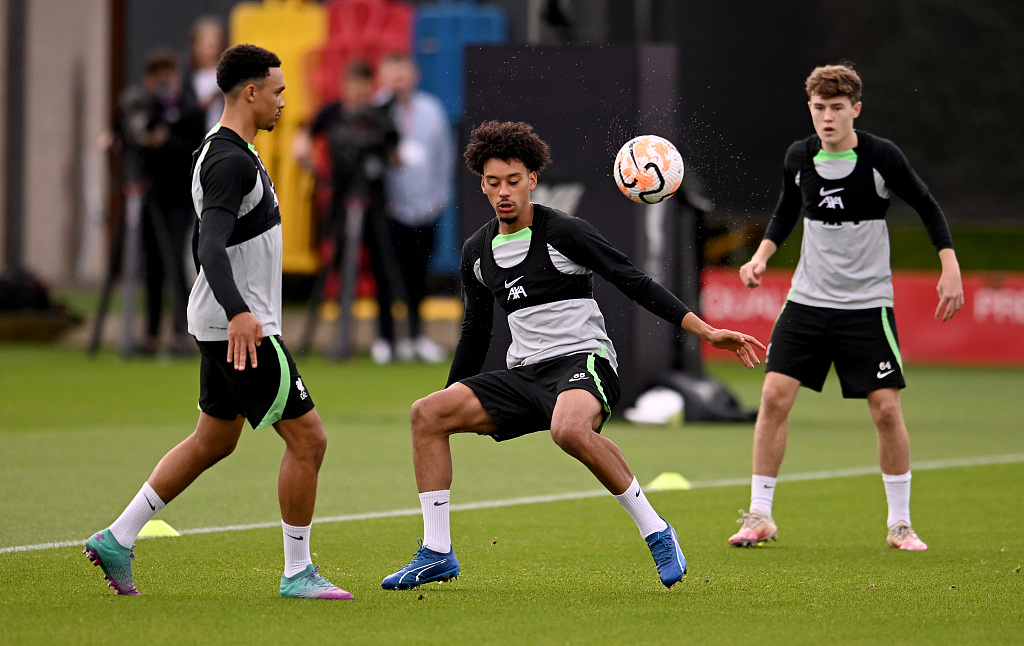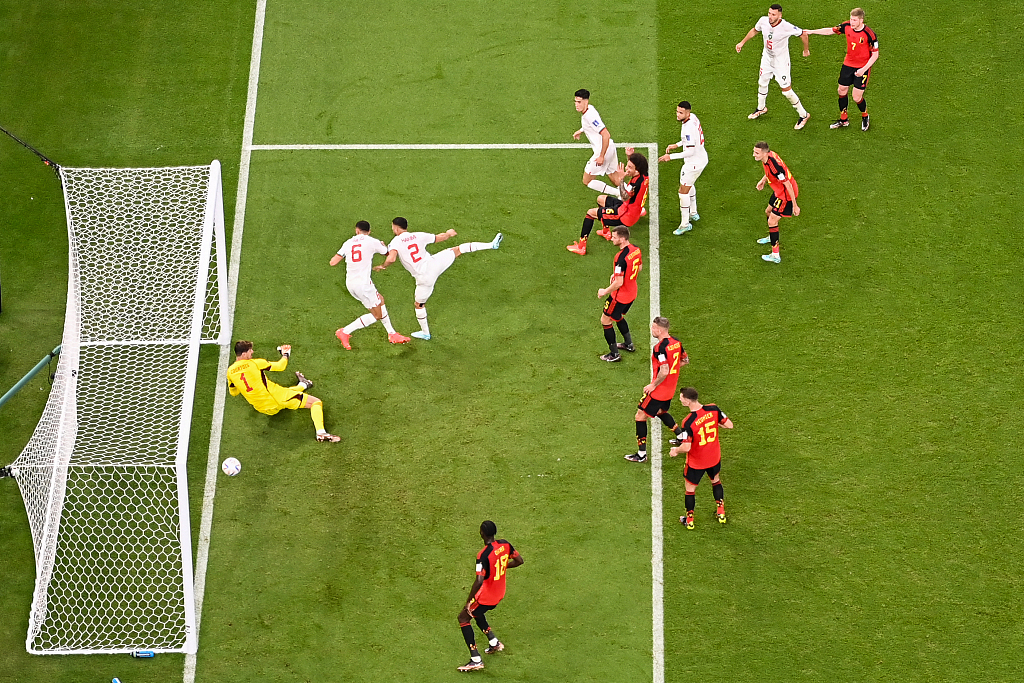
A file photo of the Old Trafford Stadium, the home ground of Manchester United. /CFP
A file photo of the Old Trafford Stadium, the home ground of Manchester United. /CFP
As artificial intelligence becomes an increasing feature in our daily lives, it is inevitable that the world's most popular sport isn't going to be left behind. Football is embracing AI like never before, leading to a profound transformation in the game. From scouting to data analysis, from training to injury prevention, AI's presence is being felt across the football world.
Take scouting, for example. Traditional scouting methods are being challenged today, with AI-powered tools enabling clubs to analyze massive amounts of data, including player statistics, player movements, passing patterns, etc.
While scouts themselves remain a key part of the sport, and the human aspect of the scouting process cannot be entirely negated, the increasing use of AI in scouting is gradually diminishing the time and cost involved in the process.
Premier League club Brighton have been among the pioneers when it comes to using AI to recruit players. As per multiple media reports in the UK, the club uses a software, whose algorithm remains a secret, to identify undervalued players from across the world.
The success of the likes of Moises Caicedo, Kaoru Mitoma, among others, attests to the efficiency of its recruitment process, which has been critical to the club's back-to-back top-half finishes in the Premier League and a European debut this season.
Two-time European champions Chelsea haven't been as tight-lipped about their use of AI in scouting. The club has teamed up with tech firm AiSCOUT to scout and recruit players for its academy.

Liverpool players during a training session at AXA Training Centre on October 19, 2023 in Kirkby, England. /CFP
Liverpool players during a training session at AXA Training Centre on October 19, 2023 in Kirkby, England. /CFP
Barcelona's Barca Innovation Hub is investing in sports tech startups and is increasing the scope of AI's use within the club. In 2021, City Football Group, which owns Manchester City, appointed a lead AI scientist.
AI is also revolutionizing the way football coaches assess player performance. AI models capable of processing vast amounts of data from wearable sensors, GPS monitoring and match footage to provide accurate insights into individual and team performance are being increasingly used by clubs.
These data can be used by coaches to identify areas for improvement, customize training schedules and make informed tactical decisions on the field. Coaches may plan ahead and regulate player workloads to prevent setbacks by using AI to foresee player fatigue and injury concerns.
These systems can then provide remedial measures to help athletes enhance their movement patterns and reduce their chance of injury.
Earlier this year, FIFA and the International Football Association Board, the body in charge of framing the sport's laws, approved the use of a new AI tracker for football boots that generates performance data, developed by sports tech firm Playermaker.
Statsports, another sports technology company that specializes in GPS player tracking and analysis equipment, partners with multiple football teams, including Liverpool, Arsenal, Brazil, the U.S., among others. In 2018, it landed a reported $1 billion deal with U.S. Soccer. The finances involved here highlight the scope and promise of the burgeoning sports tech industry as more and more sports teams embrace AI.

Morocco's defender Romain Ghanem Saiss (2L) scores a goal past Belgium's goalkeeper Thibaut Courtois (L), which was later disallowed after a VAR review during the 2022 FIFA World Cup Group F match between Belgium and Morocco at the Al-Thumama Stadium in Doha on November 27, 2022. /CFP
Morocco's defender Romain Ghanem Saiss (2L) scores a goal past Belgium's goalkeeper Thibaut Courtois (L), which was later disallowed after a VAR review during the 2022 FIFA World Cup Group F match between Belgium and Morocco at the Al-Thumama Stadium in Doha on November 27, 2022. /CFP
AI is also expected to play a more prominent role in football refereeing in the coming years. With the use of goal-line technology and video assistant referee (VAR), football has not shied away from using technological assistance to guide match officials.
While the refereeing profession is unlikely to become obsolete in the foreseeable future, it is likely to see growing AI assistance with the aim of reducing human errors.
However, speed and accuracy in real-time decisions will be key. The semi-automated offside technology, for instance, helped speed up offside calls at the recent editions of the men's and women's World Cups.
However, as VAR has demonstrated in recent years, technological intervention can affect the speed of a game and also produce contentious decisions at times.
In the Premier League this season, multiple managers have been left fuming by VAR interventions that have resulted in controversial calls, the most notable being the Tottenham-Liverpool game that saw the Reds' boss Jurgen Klopp ask for a replay after refereeing errors.
The onus will be on the sport's authorities to make sure that future AI use in match officiating doesn't affect the natural flow of a game and doesn't go beyond the ambit of preventing human errors.
The human element in football, from players, coaches, scouts and referees, is what makes it the most popular sport in the world. Fans will hope that excessive use of technological intervention doesn't turn some of these important human stakeholders into passive observers.




